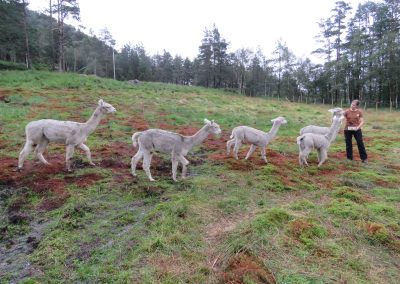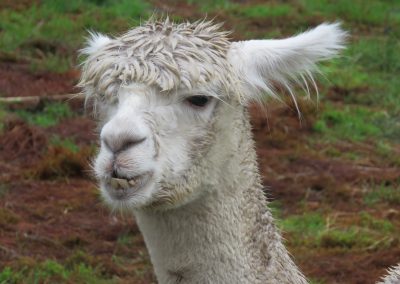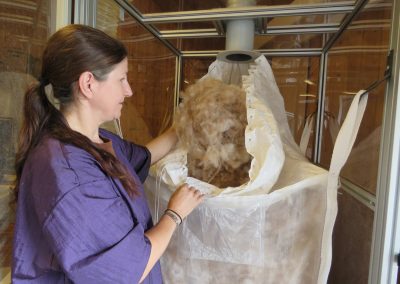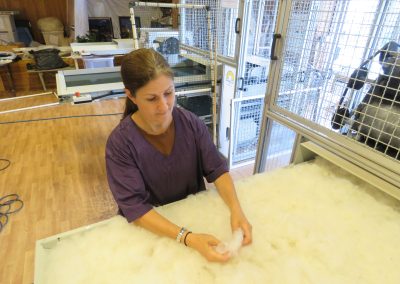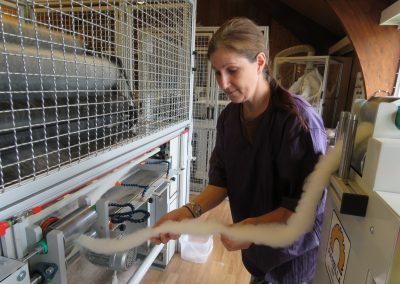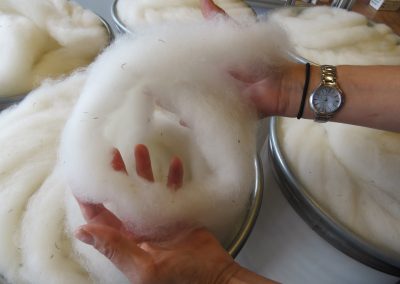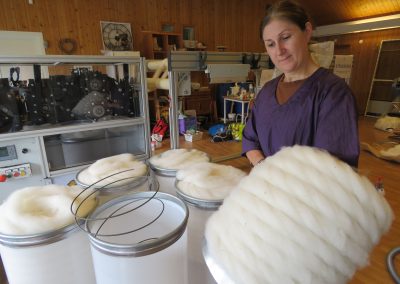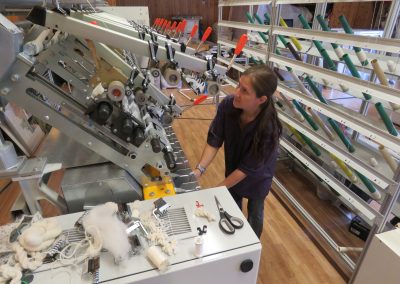By Harlen Persinger, ACN Board Member
Liz Aitken has always had an unlimited passion for knitting. Through her devoted association with this activity, the native of Plymouth, England, recently stepped into another arena—developing a keen interest in and working directly with Alpaca fiber.
Aitken moved to Norway in 1993 and is currently employed as an HMS, Quality System, and Process Engineer for Norhard, a company that provides full profile directional drilling services for the hydroelectric power plant industry. Over the past few years, she and her partner, Olav Lien Olson, have been planning an idyllic escape from city life to a county setting where they could have some animals and possibly jump-start their own business.
Since Aitken has always desired to work with fibers, she and Olsen shared an idea of developing an outlet for alpaca fiber. A few years ago, they bought a small, derelict farm near Gyland and have spent a lot of hours, blood, sweat, and, at times, a few strong words, renovating the house and putting up fences.
Golden opportunity
Aitken explains, “The initial step in this venture was to complete a market research analysis and implement a business plan which allowed them to evaluate the ‘supply and demand’ level prior to investing.
“We learned there were only a handful of woolen mills in this Scandinavian country, and very few of them are willing to provide spinning services for small-scale alpaca owners as they require larger quantities of fiber in excess of 50kg,” she says. “So we decided to proceed, our concept, to provide spinning services for alpaca owners with an end goal of producing fine alpaca yarn from our own animals as well as providing full spinning services to other adjacent alpaca owners.”
In December 2018, the couple realized their barn would not be ready in time, so they were lucky enough to lease building space to house their spinning business/mill, called Norspinn, in the center of Tonstad, a picturesque hamlet in the Sirdal area in the county of Vest Agder. They also received a grant from the local council’s scheme that lends support to local businesses, which was a positive boost for them.
Their first-hand experience of working with alpacas came seven months later with the purchase of 10 animals. Making this move solidified their commitment to build a successful enterprise and provided the necessary foundation for offering spinning services and buying fiber from Alpaca producers in the surrounding area. Aitken says establishing their business in this part of Norway is a bonus, as there are several small to medium alpaca farms in the area and a very active knitting and fiber community.
Forward-thinking
“In order to allow Norspinn to grow, we have invested in the most current fiber-producing technology with machines from Ramella, a family-run company from Biella, Italy. In this way, Norspinn’s workforce can expand without the need to invest in an additional process line. We have also made some of our own equipment. The main machines from Italy include a picker, de-hairier, carder, pin drafter, can coilers, a spinning, and plying machine, and a skein winder,” she adds.
Aitken notes several of the machines required to produce yarn are large and heavy. The process starts with tumbling to remove dust, dirt and second cuts. The fiber is then washed and dried. The process continues with a picker, which opens the fibers and removes tangles. Next, the de-hairer takes out any guard hairs and vegetable matter which helps prepare the fiber for carding. Carding is the step where the fiber is combed and turned into a sausage-looking strip, known as a ‘sliver’. Next is the drafter, which combs and stretches the fiber further in preparation for spinning. Single threads are spun first and then plied together, usually in pairs, depending on the weight and type of yarn required. After plying, the finished yarn is wound into skeins. At the present time, dying is not available at Norspinn, but plans call for that option to be available in the future.
Building blocks
Since the couple has a limited background in this type of business, they have inquired and obtained knowledge from equipment manufacturers, visited and helped out at other mills, attended educational courses, and searched the internet. Another valuable resource was meeting and talking with alpaca breeders and owners. One excellent contact has been conversing with a friend and breeder who has over 70 animals and also sells her own yarn and other alpaca products. Previously she had delivered her fiber to a mill in Telemark but has switched to Norspinn, which now has a dozen clients.
The alpaca entrepreneur notes there is never enough time in the day or week to complete every chore involved with this enterprise. The population of alpacas in Norway is increasing as is the demand for natural fibers.
Public awareness
People are becoming more aware of the benefits of alpaca fiber compared to sheep wool. Aitken believes the way to expand the alpaca fiber market is to increase public awareness, profiling the positive properties and benefits of this luxuriously soft and allergy-friendly fiber.
“I maintain thoughts of revitalizing Norwegian knitting traditions to include alpaca fiber and am planning ways to create new products that stay abreast of the market and fulfill current customer preferences.
“The international fashion industry is starting to recognize the unique quality and health benefits of alpaca fiber,” she adds. “In this world of cutting-edge technology, embraced by global markets and with continued support from the community, I’m confident that our business can grow and prosper in Tonstad and the surrounding area.” – Persinger operates HLens Freelance from Milwaukee, WI. He is a past recipient of several ACN writing and photography awards.
IMG_6507
Aitken purchased her 10 alpacas from a local breeder. These animals produce around 4 kilos of wool annually (about 60 percent of this will be of good quality for spinning depending on the micron size) for five to seven years.
IMG_6543
Statistics from the Norwegian Alpacas Association suggest there are close to 3,000 registered animals in the country. Aitken notes they are much easier to manage than sheep, respect fencing and prefer to be outside year round.
IMG_6426
Fibers have been picked, dehaired and placed on the carding table. A conveyer belt carries the fibers into machines where over 11 rollers work to card the fiber.
IMG_6433
Aitken purchased her 10 alpacas from a local breeder. These animals produce around 4 kilos of wool annually (about 60 percent of this will be of good quality for spinning depending on the micron size) for five to seven years.
IMG_6436
After exiting the carder, fibers are loosely twisted into a sliver which is drawn gently into a can coiler.
IMG_6443
The can coiler rotates slowly, coiling the sliver neatly into a coiling can. The operator presets the amount that goes into each can.
IMG_6446
The slivers are very delicate and must be handled carefully to avoid damage. Here you see just how neatly the slivers are coiled after being combed and stretched during the drafting process. The cans are engineered with a spring to lower or lift the sliver as the can fills or empties.
IMG_6450
The slivers are threaded through the spinning machine, on the left-had side and the single spur threads are collected on canes, just under Aitken’s hands in the picture. Once the singles are spun, the cones are moved to the frame on the right (behind Aitken) and plied together by threading them back into the spinning machine which is programmed by the operator to spin or ply as required.

